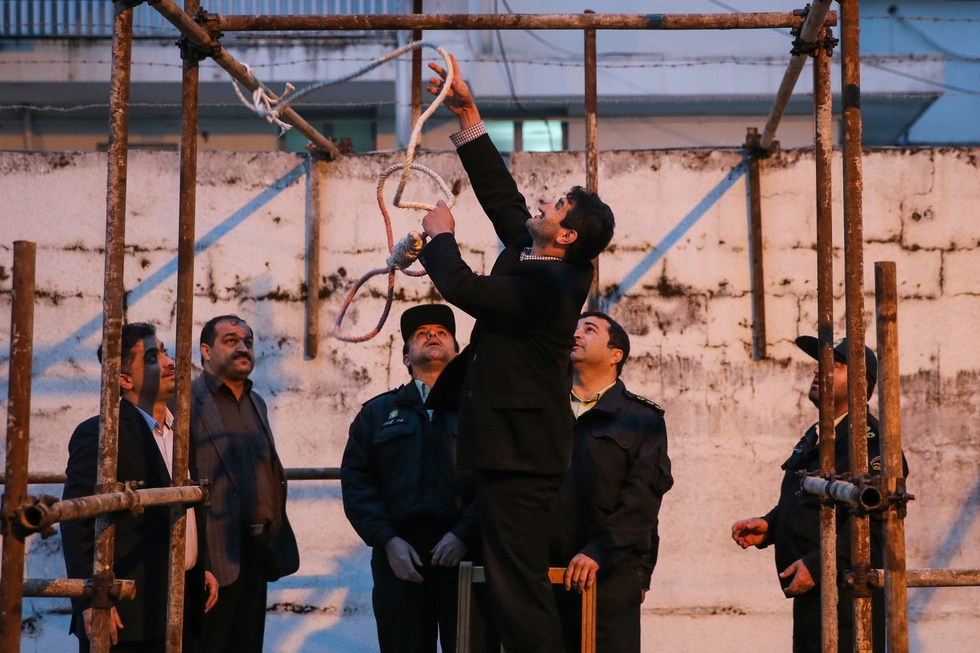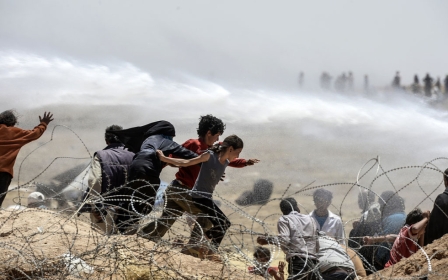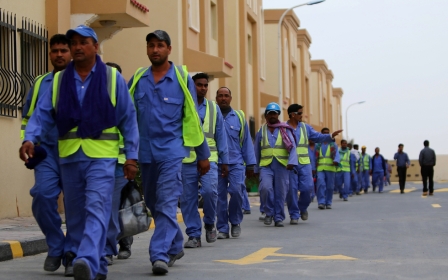Iran leads 'alarming surge' in Middle East executions

Governments across the Middle East executed at least 1,196 people in 2015, according to a new report released by Amnesty International, with Iran leading the region.
“The rise in executions last year is profoundly disturbing,” said Salil Shetty, Amnesty International’s secretary-general. “In 2015 governments continued relentlessly to deprive people of their lives on the false premise that the death penalty would make us safer.”
Executions in Iran made up 82 percent of that figure, with 977 death sentences carried out.
It makes the Islamic Republic the largest executioner of people in the world apart from China.
Figures for China are not accessible, as executions are treated as a state secret, but it is thought they run into the thousands each year.
Saudi Arabia is ranked fourth in the world in terms of executions, after Pakistan, which put 326 people to death this year following a six-year moratorium on capital punishment.
The kingdom put 158 people to death in 2015, or 13 percent of the regional total.
Both Iran and Saudi Arabia increased executions last year by 31 and 76 percent respectively, compared with 2014.
It comes in the context of what Amnesty calls an “alarming surge” in judicial executions around the world.
According to the rights group, 1,634 people globally were known to be executed in 2015, an increase of 50 percent over 2014 and the highest number Amnesty has recorded since 1989.
Iran, Saudi Arabia and Pakistan altogether account for 89 percent of those executions.
“Iran, Pakistan and Saudi Arabia have all put people to death at unprecedented levels, often after grossly unfair trials,” Shetty said. “This slaughter must end.”
Oman and Israel were the only countries in the Middle East that did not hand down any death penalties during 2015.
Unfair trials
As well as the 1,196 executions, at least 831 death sentences were handed down. Of these, Egypt issued 538, but only executed about 22 people.
“Many of the death sentences followed trials that were unfair," the Amnesty report said, referencing a mass trial of 188 people that begin in 2014 and lead to the sentencing of 183 people to death in 2015.
Egypt was far from alone in being criticised for the fairness of its legal system, with Amnesty saying that many of the trials across the region and the world were not fair.
“Many death sentences in Iran were imposed after trials that fell short of international fair trial standards,” the report said.
“Defendants often had no access to lawyers during pre-trial investigations, and courts generally dismissed allegations of torture and admitted as evidence “confessions” obtained under torture.
“As in previous years Iranian courts continued to sentence people to death for crimes that are vaguely worded and overly broad; not recognizably criminal offences under international human rights law; and do not meet the threshold of the “most serious crimes”.”
According to international law, only crimes categorised as “most serious” can lead to the death penalty. At the moment, this is confined to intentional killings.
Among the charges leveled against people given the death penalty in Iran were “spreading corruption on earth”, “effective collaboration with PJAK” (Party of Free Life of Kurdistan) and “enmity against God”.
PJAK is a Kurdish militant group that has waged an armed struggle for self-determination for Kurds in Iran. The Islamic Republic has labeled it as a "terrorist organisation".
However, the majority of people sentenced to death were for drug-trafficking offences.
Capital punishment for juveniles and foreign nationals
Iran also came under fire for continuing to sentence juveniles to death.
In 2015, Iran executed four people who were under 18 when they committed the crimes of which they were convicted.
According to Amnesty, at least 160 juvenile offenders were on death row at the end of 2015. Some have been in prison for more than a decade.
At least 73 juvenile offenders were executed in Iran between 2005 and 2015.
In Saudi Arabia, 158 people were executed, of which 73 were foreign nationals, many of whom weren't presented with any details of their case in a language they spoke, Amnesty said.
“Saudi Arabia continued to use the death penalty disproportionately on foreign nationals, the majority of whom were migrant workers with no knowledge of Arabic – the language in which they were questioned while in detention and in which trial proceedings were carried out,” the report said.
“Foreign nationals were often denied adequate interpretation assistance.
“Their country’s embassies and consulates were not promptly informed of their arrests, or even of their executions.”
The country also held public executions, displayed bodies and failed to return those bodies to their families, the report found.
Elsewhere in the region, the first executions since 2008 were carried out in the Kurdistan region of Iraq when three men were hanged for the abduction and murder of two schoolgirls in 2011 and 2012.
In the rest of Iraq, 23 further executions were carried out, and at least 89 death sentences were passed, but the figure could be much higher.
“Former President Jalal Talabani had refused to ratify any death sentences while in office,” Amnesty said.
“During the year, President Fuad Masum came under significant pressure from Iraqi MPs and the public to ratify death sentences.”
In July, a spokesman for the president announced he was working through a backlog of more than 600 death sentences.
“Amnesty International [is] seriously concerned that many of the death sentences that President Masum might have ratified in 2015 were of individuals convicted on the basis of “confessions” obtained under torture, televised “confessions” admitted as evidence against other defendants, or information obtained through secret informants in total disregard for international fair trial guarantees.”
According to the report, it is impossible to get comprehensive figures from some countries, including Syria, because of the ongoing war.
Executions have become increasingly prevalent
Overall, the region had an increase in executions of 26 percent, and the first four months of 2016 seem to be continuing along these lines.
On 2 January, Saudi Arabia announced it had executed 47 prisoners on terrorism charges.
Four of the men were convicted of banditry, a crime that is punished in Saudi Arabia by having alternate limbs cut off on opposite sides of the body, followed by beheading and the display of the corpse.
A security source who guarded a Riyadh execution site told Middle East Eye “It was a massacre.
“There was blood and body parts everywhere.”
Others in the group were juveniles who had been in prison for more than a decade, and a mentally ill man who had his limbs cut off before being beheaded.
By April, Saudi Arabia has already executed 82 people. If the current rate is maintained, it is possible it could double the number of executions it carried out in 2015.
“As Saudi Arabia looks set for yet another record-breaking year of beheadings, it is more important than ever that its allies in the UK, Europe and the US call for it to stop,” said Maya Foa, director of the death penalty team at Reprieve.
“The deep injustices of the Saudi system mean that those being sent to the swordsman’s blade are in many cases tortured into ‘confessing,’ guilty of nothing more than calling peacefully for reform, or even sentenced to death as children.”
In March, 100 people in prison for drug offences in Iran were told to prepare for their impending deaths.
The executive director of Iran Human Rights called on Europe to prevent the killings, looking to improved relations between the west and Iran as a means to changing the policy.
“We call on European countries to use their improved relations with Iran to stop the arbitrary executions of these prisoners, and to push for a moratorium on the death penalty for drug offences,” said Mahmood Amiry Moghaddam.
“It is time for Europe to show that their improved relations with Iran will also benefit human rights.”
New MEE newsletter: Jerusalem Dispatch
Sign up to get the latest insights and analysis on Israel-Palestine, alongside Turkey Unpacked and other MEE newsletters
Middle East Eye delivers independent and unrivalled coverage and analysis of the Middle East, North Africa and beyond. To learn more about republishing this content and the associated fees, please fill out this form. More about MEE can be found here.




